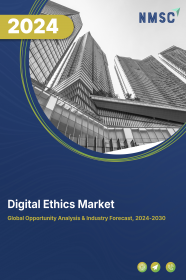
Digital Ethics Market by Component (Software and Services), by Deployment Model (On-Premises and Cloud-Based), by Application (Risk Management, Cybersecurity Practices, Compliance Management, and Others), and by End Users (IT & Telecom, Healthcare, Retail & E-commerce, BFSI, and Others)– Global Opportunity Analysis and Industry Forecast 2024-2030.
US Tariff Impact on Digital Ethics Market
Trump Tariffs Are Reshaping Global Business
Digital Ethics Market Overview
The global Digital Ethics Market size was valued at USD 146.3 million in 2023 and is predicted to reach USD 1421.2 million by 2030 with a CAGR of 35.6% from 2024-2030.
Digital Ethics Market focuses on the growing field of ethical practices and principles governing the use of digital technologies, including data privacy and artificial intelligence. It includes solutions that guide organizations in making responsible decisions regarding technology use, ensuring compliance with regulations, and promoting transparency and accountability.
These solutions offer several advantages, such as enhanced stakeholder trust, improved risk management, and the promotion of a culture of ethical responsibility within organizations. Additionally, these solutions help businesses differentiate themselves in a competitive landscape, where consumers increasingly prioritize ethical considerations in their interactions with companies. Moreover, it plays a crucial role in shaping responsible technology practices and fostering a more sustainable digital ecosystem.
Market Dynamics and Trends
The worldwide expansion of the telecom industry drives the digital ethics market growth. These surge in data privacy concerns lead companies to focus on ethical data handling data handling practices to safeguard user information.
As per the latest report published by the World Economic Forum, the global telecommunications market is projected to grow from USD 1.81 trillion in 2022 to USD 2.65 trillion by 2030, reflecting a growth of 46.1% within a time span of 8 years.
This propels the need for strong information ethics frameworks to address the emerging challenges related to data privacy and security that in turn accelerates the growth of the information ethics due to the increasing reliance on digital communication and data-sharing platforms.
Additionally, the rising automotive sector propels the growth of the market as it increasingly integrates advanced technologies such as AI and data analytics. This technological adoption raises data privacy concerns, driving companies to adopt stricter data handling practices for secure information use.
As per the report published by the European Automobile Manufacturers Association (ACEA) in 2024, the global car production reached 76 million in 2023, reflecting a rise of 10.2% compared to 2022. This surge in automobile production highlights the critical need for enhanced digital ethics to ensure responsible data utilization within the expanding automotive sector.
Moreover, the digital ethics market demand is due to the increasing volume of online transactions and consumer data generated. This rise in digital activity raises concerns over data privacy, security, and ethical practices, prompting online businesses to seek solutions that ensure regulatory compliance and protect customer information.
As per the report published by the International Trade Administration (ITA) in 2024, the global B2C e-commerce revenue reached USD 4.19 trillion in 2024 and is projected to rise to USD 5.5 trillion by 2027, marking a 31.2 % growth within a span of 3 years. This rapid growth emphasizes the need for robust digital ethics frameworks to address the challenges associated with data management and consumer trust.
However, the cost of implementing digital ethics frameworks acts as a significant barrier, with substantial training and compliance expenses deterring smaller organizations from adopting these practices, thereby hindering the digital ethics market expansion.
On the contrary, the integration of artificial intelligence (AI) and automation in digital ethics is expected to create significant growth opportunities in the future. This combination enables organizations to enhance compliance, streamline ethical decision-making processes, and monitor data usage in real-time. As a result, businesses can ensure responsible AI practices, mitigate risks, and build consumer trust, driving demand for advanced information ethics solutions.
Market Segmentation and Scope of the Study
The digital ethics market report is segmented on the basis of component, deployment model, application, end users, and region. On the basis of component, the market is divided into software and services. On the basis of deployment model, the market is classified into on-premises and cloud-based. On the basis of application, the market is segmented into risk management, cybersecurity practices, compliance management, and others.
On the basis of end users, the market is divided into IT & telecom, healthcare, retail & e-commerce, BFSI, and others. Regional breakdown and analysis of each of the aforesaid segments include regions comprising North America, Europe, Asia-Pacific, and RoW.
Geographical Analysis
North America dominates the digital ethics market share and is projected to maintain its dominance throughout the forecast period. This is attributed to the rising telecom sector in the region that drives the demand for information ethics solutions as companies seek to ensure data privacy and security in an increasingly connected environment.
As per the report published in 2022 by the Canadian Radio-Television and Telecommunications Commission (CRTC), the total revenue of the Canadian telecommunications sector increased by 3.5% from 2021, reaching USD 42.3 billion in 2022. This growth highlights the necessity for information ethics solutions to effectively manage data challenges and strengthen consumer trust in the telecom industry, thereby fueling market expansion.
Additionally, the growth of the insurance sector in the region propels the expansion of the market, fueled by the rising reliance on data analytics and digital platforms for risk assessment and customer management. These concerns regarding data privacy and the ethical handling of sensitive information increase as insurers collect and analyze vast amounts of personal data.
According to the report of the Insurance Information Institute published in 2023, the net premium of insurance in the U.S. increased from USD 1.49 billion in 2022 to USD 1.54 billion in 2023, reflecting a growth of 3.4%. This upward trend in insurance premium emphasizes the critical need for robust digital ethics frameworks to ensure the responsible use of data in the insurance industry.
On the other hand, Asia Pacific is expected to show a steady rise in the digital ethics industry due to the significant growth of the e-commerce industry, driving increased online transactions and data generation.
As per the latest report published by the India Brand Equity Foundation, Indian e-commerce sales is projected to grow at a CAGR of 18.2% from 2021 to 2025, reaching USD 120.1 billion by 2025. This notable growth in the e-commerce sector signifies the critical need for effective information ethics solutions to address challenges related to data privacy and security, thus fostering the market growth in the region.
Furthermore, the rising automotive sector in the region drives the growth of the digital ethics industry due to the increasing integration of advanced technologies, such as connected vehicles and autonomous driving systems.
This integration raises significant ethical concerns regarding data privacy, cybersecurity, and user consent as vehicles gather and share substantial amounts of data. According to the report of the International Trade Administration (ITA) published in 2023, the domestic production of automobile in China is expected to reach 35 million vehicles by 2025.
This increase in car production emphasizes the essential demand for effective digital ethics frameworks to manage the complexities arising from technological innovations in the automotive industry.
Competitive Landscape
The digital ethics industry comprises of various key market players such as Salesforce, Inc., Apple Inc., Microsoft Corporation, Google LLC, Signum.AI, Uber Technologies, Inc., Shutterstock, Inc., Dentsu Inc., Owkin Inc., IBM Corporation, and others.
These market players are adopting various strategies including product launches and partnership to stay competitive and maintain their market positions. For instance, in July 2024, Shutterstock, Inc. launched generative 3D API, enabling enterprises to quickly and ethically create realistic 3D printing models using artificial intelligence. This API, built on the NVIDIA Edify generative AI architecture, is in commercial beta. These features allow users to generate high-quality 3D content from text or 2D images.
Furthermore, in February 2024, Dentsu partnered with the GoodNet to launched the ethical media index (EMI) in the UK, aimed at helping brands measure and improve the ethical performance of their digital advertising campaigns. This initiative addresses the increasing demand for sustainable and ethical media investments, particularly in a climate of economic volatility.
Key Benefits
-
The report provides quantitative analysis and estimations of the digital ethics market from 2024 to 2030, which assists in identifying the prevailing industry opportunities.
-
The study comprises a deep dive analysis of the current and future digital ethics market trends to depict prevalent investment pockets in the industry.
-
Information related to key drivers, restraints, and opportunities and their impact on the digital ethics market is provided in the report.
-
Competitive analysis of the key players, along with their market share is provided in the report.
-
SWOT analysis and Porters Five Forces model is elaborated on the study.
-
Value chain analysis in the market study provides a clear picture of roles of stakeholders.
Digital Ethics Market Key Segments
By Component
-
Software
-
Services
By Deployment Model
-
On-Premises
-
Cloud-Based
By Application
-
Risk Management
-
Cybersecurity Practices
-
Compliance Management
-
Others
By End Users
-
IT & Telecom
-
Healthcare
-
Retal & E-commerce
-
BFSI
-
Others
By Region
-
North America
-
The U.S.
-
Canada
-
Mexico
-
-
Europe
-
The UK
-
Germany
-
France
-
Italy
-
Spain
-
Denmark
-
Netherlands
-
Finland
-
Sweden
-
Norway
-
Russia
-
Rest of Europe
-
-
Asia Pacific
-
China
-
Japan
-
India
-
South Korea
-
Australia
-
Indonesia
-
Singapore
-
Taiwan
-
Thailand
-
Rest of Asia Pacific
-
-
RoW
-
Latin America
-
Middle East
-
Africa
-
Key Players
-
Salesforce, Inc.
-
Apple Inc.
-
Microsoft Corporation
-
Google LLC
-
Signum.AI
-
Uber Technologies, Inc.
-
Shutterstock, Inc.
-
Dentsu Inc.
-
Owkin Inc.
-
IBM Corporation
REPORT SCOPE AND SEGMENTATION:
|
Parameters |
Details |
|
Market Size in 2023 |
USD 146.3 million |
|
Revenue Forecast in 2030 |
USD 1421.2 million |
|
Growth Rate |
CAGR of 35.7% from 2024 to 2030 |
|
Analysis Period |
2023–2030 |
|
Base Year Considered |
2023 |
|
Forecast Period |
2024–2030 |
|
Market Size Estimation |
Million (USD) |
|
Growth Factors |
|
|
Countries Covered |
28 |
|
Companies Profiled |
10 |
|
Market Share |
Available for 10 companies |
|
Customization Scope |
Free customization (equivalent up to 80 working hours of analysts) after purchase. Addition or alteration to country, regional, and segment scope. |
|
Pricing and Purchase Options |
Avail customized purchase options to meet your exact research needs. |

















 Speak to Our Analyst
Speak to Our Analyst





















